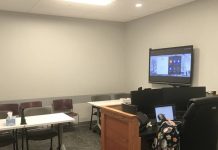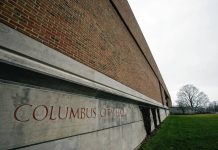
COLUMBUS, Ind. — A group protesting “inappropriate” books in Bartholomew Consolidated School Corp. libraries took over the public comment section of Monday night’s school board meeting, taking full advantage of a new policy that allows the public to talk about any subject, whether or not it is on the agenda.
About 70 people attended Monday’s board meeting, with nearly 20 speaking during the time for public comment. Roughly half of these individuals offered their opinions on library materials, with some calling for the removal of “inappropriate” books and others pushing back against this request.
The meeting was the first since the board voted in July to implement new procedures for public comment, including an elimination of a previous rule that required all comments to be on agenda items.
Some of the individuals who were concerned about inappropriate library materials read off lists of how many times curse words are included in certain titles or read explicit passages featuring topics such as molestation, gay sex and instructions about sexual acts.
“I think that most people in this room would agree that books with pornography, graphic photos of sexual content and violence, teenage prostitution and drug use, books suggesting murdering someone, bludgeoning them to death, do not belong in the school library,” Megan Johnson said. “Yet here we are. If you are truly concerned about the mental health of our youth like you say you are, I’m urging you to create a committee to address this.”
Another individual who spoke was Eric Grow, who ran for the school board’s District 4 seat but was defeated by Dale Nowlin.
Grow has repeatedly expressed concerns about inappropriate materials in school libraries during the time for public comment at school board meetings and has been vocal about the subject on social media, creating a spreadsheet of books that he considers “problematic” and which BCSC school libraries, if any, contain copies of these titles.
“I’m a BCSC parent, I help run the ‘Grow Strong Schools’ community group and I’m here with the Bartholomew County chapter of Parents Rights in Education,” he said at Monday’s meeting. “Concerns of inappropriate content in our school libraries were brought to this body starting nearly two years ago. Parents came together and started combing catalogues. Examples were brought to these meetings, sent in emails, had in conversations, but the issue was never addressed by the board or admin(istration). We’ve since been compiling a running list of books with reviews, ratings and locations within BCSC libraries.”
Some of the books on the list are “fine,” he said, but others are “so bad it’s abusive for an institution with authority to put them in front of kids.”
He pointed to pornographic content, descriptions of sex acts, rape, violence, self-harm, suicide, “normalizing abortion,” “sensationalizing drugs” and profanity as reasons for objection.
Grow’s booklist spreadsheet also features categories such as activism, “controversial cultural, political, social, historical or racial commentary,” “controversial/inflammatory religious commentary,” “alternate gender, sexual ideologies, dysmorphic,” social-emotional learning, critical race theory, diversity, equity and inclusion, and racism.
He added that the group has noticed that inappropriate books have been “disappearing from school catalogs.”
“While we are happy to see some of them go, this raises more foundational concerns,” Grow said. “Concerns of transparency and candor. Many questions immediately pop up that our community should know. What books were in our libraries, and why were they taken out? What criteria is being used to make the decision? Why is this being done quietly without addressing the issue?”
He asked for the matter to be addressed through community discussions with the board, with all sides being heard.
However, other speakers argued that content that is viewed as objectionable by some should still be available to students, as it may be beneficial for those who feel alone or have been through difficult experiences that they need help navigating.
“Parents will sometimes disagree on what’s appropriate and what’s not, so the books that are there matter less than how the people, how the children in the school feel, how welcomed they feel, how seen they are,” said Jason Tracy. “One of the hard things that I’m sure every parent has gone through is the realization that you can’t protect your children from the things in the world that you see as awful. And for some parents, those are words, and sometimes it’s hate and it’s disdain for who someone really is.”
For the complete story and more photos, see Wednesday’s Republic.




